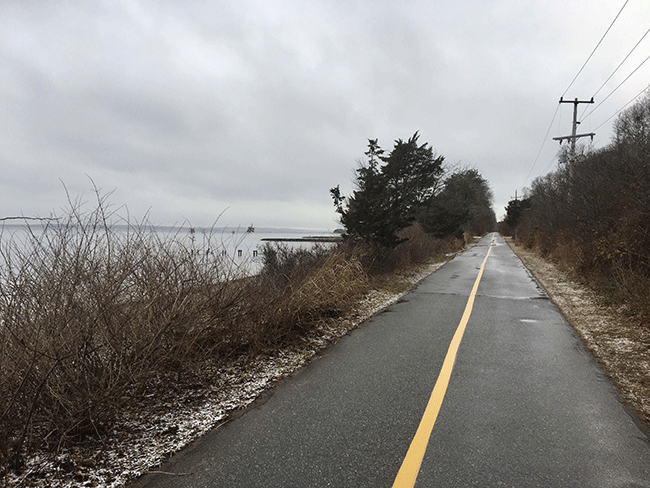Programs Blog
An Appreciation for the Liminality of Woods Hole

Ashby Gentry, Boston UniversityOne of the first things I learned in acting school was the concept of a liminal space, or a place of being in-between. As an actor, my entire job consists of navigating various liminal spaces. See, that’s all a play really is. It’s a state of being in-between. What we are “in-between” is a set of two different stasis—periods of equilibrium. Every play (traditionally) follows this basic function: there is an initial stasis (exposition), a disruption of that stasis (inciting event), the liminal period or liminal space (everything that happens in the play), and the establishment of a new stasis (conclusion). Basically, 90% of the play takes place in this liminal period where we aren’t quite in the exposition but also not quite in the conclusion. We are, for lack of better term, floating in limbo.
The action of a play, however, is certainly not the only liminal space we pass through over the course our lives. Other examples of liminal spaces I have encountered in my lifetime include: hospital waiting rooms, The DMV, Grand Central Station, laundromats, Waffle House at 2 AM, etc. All of these locations have that same mystic, eerie quality that renders them, in my personal opinion, rather beautiful.
Cape Cod—and particularly Woods Hole—is a liminal space for several reasons. For the general public, it is the allure of Cape Cod’s liminality that attracts so many of its seasonal inhabitants. Cape Cod sits as a space between the great forests of New England and the vast ocean of the Atlantic. It serves as a point between the often restrictive confines of civilization, and the treacherous freedom of the open ocean. Liminality offers us the break from reality, without the immersive danger of the wild.
For us here at SEA, Woods Hole is more of a literal liminal space. It serves as our home base during our time post-university, but pre-sea. It is fundamentally, a period of in-between. Though often overlooked, liminal spaces such as Woods Hole are of great importance. Could you imagine if we merely jumped headfirst into the sea component of our voyage? That sounds like a disaster waiting to happen. Woods Hole affords us the necessity of time. Time to prepare ourselves mentally, emotionally, and spiritually for our voyage to come. But also time to establish a sense of camaraderie before the adventure we’ll soon be immersed in. Either through late night Uno games, communal shopping and cooking, or trips to Cinema Pub, Woods Hole is essential in the establishment of the heart and soul of our ship, and its vitality should not be understated.
It’s easy to overlook this transitory area given its fundamental nature as a space people constantly pass through. However, when one takes time to stop and smell the roses, its beauty is almost marvelous. This became clear to me on a bike ride that I took with my roommate, Lief, sometime last week. There was something uniquely beautiful about the vacant wintry beaches, caressed softly with the kiss of freshly fallen snow. For me, it was extremely gratifying to enjoy the simplicity of a quiet bike ride through a quiet forest, past a quiet beach, and into a quiet town. Though this placid nature is particularly characteristic of the winter months, it is Woods Hole’s liminality that affords it this luxury.
I am particularly grateful to find myself in the liminal space that we call, Woods Hole. As an artist I am accustomed to feelings of pressure: the pressure to perform, the pressure to sustain myself, the pressure of school, and the recently imminent pressure of the rest of my life. Woods Hole has reminded me of the under-appreciated luxury of waiting. Eventually all these pressures will return to haunt me; however, as for right now there’s really no way to interact with them. They are indefinitely suspended. So, although one might be quick to reduce our time in Woods Hole to a period of waiting, I would argue that waiting periods offer immense opportunity. For only when one takes the time to sit and wait, does the complex beauty within the simple spaces of our universe reveal itself.
– Ashby Gentry, Boston University
Recent Posts from the Ships
- Ocean Classroom 2024-A collaborative high school program with Proctor Academy
- Collaborations and Long-term Commitments: SEA’s Caribbean Reef Program Sets a Course for Coastal Programs that Compliment Shipboard Experiences.
- Sea Education Association students prepare for life underway using state of the art nautical simulation from Wartsila Corporation.
- SEA Writer 2022, Magazines From the Summer SEA Quest Students
- Technology@SEA: Upgrades Allow Insight into Ocean Depths
Programs
- Gap Year
- Ocean Exploration
- High School
- Science at SEA
- SEA Expedition
- SEAScape
- Pre-College
- Proctor Ocean Classroom
- Protecting the Phoenix Islands
- SPICE
- Stanford@SEA
- Undergraduate
- Climate and Society
- Climate Change and Coastal Resilience
- Coral Reef Conservation
- Marine Biodiversity and Conservation
- MBL
- Ocean Exploration: Plastics
- Ocean Policy: Marine Protected Areas
- Oceans and Climate
- Pacific Reef Expedition
- The Global Ocean: Hawai'i
- The Global Ocean: New Zealand